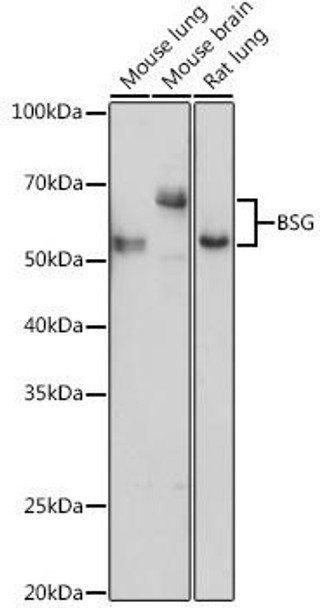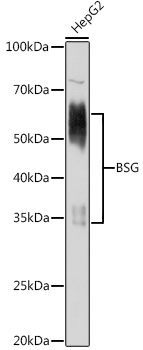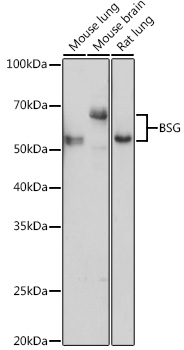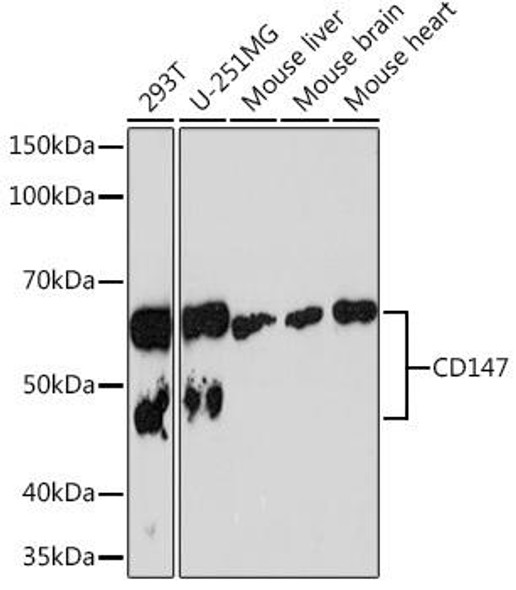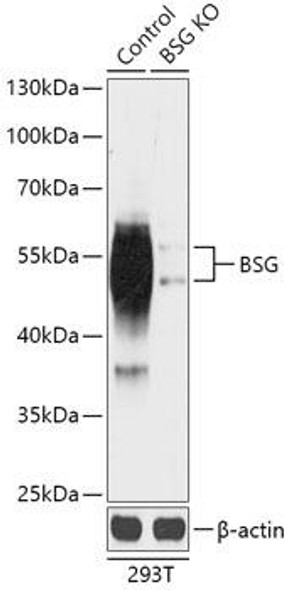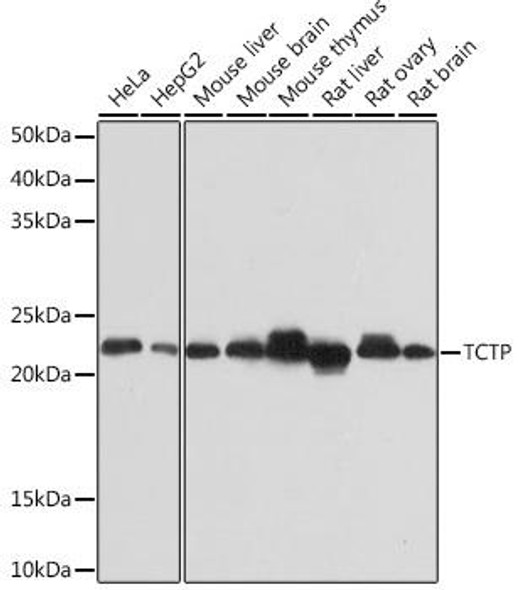Description
Anti-BSG Antibody (CAB16662)
The BSG Polyclonal Antibody (CAB16662) is a valuable tool for researchers studying BSG, also known as Basigin. This cell surface glycoprotein is involved in various cellular processes, including cell adhesion, migration, and signaling. The antibody, generated in rabbits, exhibits high reactivity with human samples and is validated for use in Western blot applications.By binding specifically to the BSG protein, this antibody enables precise detection and analysis in a variety of cell types. Its versatility makes it ideal for studies in cell biology, cancer research, and immunology.
Understanding the role of BSG in these processes can provide insights into cancer progression, immune response modulation, and potential therapeutic targets.Given the diverse functions of BSG in cellular physiology, this polyclonal antibody is a valuable tool for researchers looking to explore its involvement in various diseases and biological processes. Its specificity and reliability make it a valuable asset for any laboratory conducting studies related to BSG and its implications in health and disease.
| Antibody Name: | Anti-BSG Antibody |
| Antibody SKU: | CAB16662 |
| Antibody Size: | 20uL, 50uL, 100uL |
| Application: | WB |
| Reactivity: | Human, Mouse, Rat |
| Host Species: | Rabbit |
| Immunogen: | Recombinant fusion protein containing a sequence corresponding to amino acids 45-200 of human BSG (NP_940991.1). |
| Application: | WB |
| Recommended Dilution: | WB 1:500 - 1:2000 |
| Reactivity: | Human, Mouse, Rat |
| Positive Samples: | HepG2, Mouse lung, Mouse brain, Rat lung |
| Immunogen: | Recombinant fusion protein containing a sequence corresponding to amino acids 45-200 of human BSG (NP_940991.1). |
| Purification Method: | Affinity purification |
| Storage Buffer: | Store at -20'C. Avoid freeze / thaw cycles. Buffer: PBS with 0.02% sodium azide, 50% glycerol, pH7.3. |
| Isotype: | IgG |
| Sequence: | DSAT EVTG HRWL KGGV VLKE DALP GQKT EFKV DSDD QWGE YSCV FLPE PMGT ANIQ LHGP PRVK AVKS SEHI NEGE TAML VCKS ESVP PVTD WAWY KITD SEDK ALMN GSES RFFV SSSQ GRSE LHIE NLNM EADP GQYR CNGT SSKG SDQA IITL |
| Gene ID: | 682 |
| Uniprot: | P35613 |
| Cellular Location: | Cell membrane, Melanosome, Single-pass type I membrane protein |
| Calculated MW: | 19kDa/22kDa/29kDa/42kDa |
| Observed MW: | 38-65KDa |
| Synonyms: | BSG, 5F7, CD147, EMMPRIN, OK, TCSF, basigin |
| Background: | The protein encoded by this gene is a plasma membrane protein that is important in spermatogenesis, embryo implantation, neural network formation, and tumor progression. The encoded protein is also a member of the immunoglobulin superfamily. Multiple transcript variants encoding different isoforms have been found for this gene. |
| UniProt Protein Function: | BSG: Plays pivotal roles in spermatogenesis, embryo implantation, neural network formation and tumor progression. Stimulates adjacent fibroblasts to produce matrix metalloproteinases (MMPS). May target monocarboxylate transporters SLC16A1, SLC16A3 and SLC16A8 to plasma membranes of retinal pigment epithelium and neural retina. Seems to be a receptor for oligomannosidic glycans. In vitro, promotes outgrowth of astrocytic processes. Enriched on the surface of tumor cells. Up-regulated in gliomas. Its expression levels correlate with malignant potential of the tumor. Forms homooligomers in a cis-dependent manner on the plasma membrane. Forms a complex with MMP1 at the tumor cell surface. Interacts with SLC16A1 and SLC1A3; probably a BSG dimer is associated with a monocarboxylate transporter dimer. Interacts with ATP1B2, MAG and L1CAM. Interacts with AJAP1. 2 isoforms of the human protein are produced by alternative splicing. |
| UniProt Protein Details: | Protein type:Membrane protein, integral; Immunoglobulin superfamily Chromosomal Location of Human Ortholog: 19p13.3 Cellular Component: acrosomal membrane; focal adhesion; Golgi membrane; integral to plasma membrane; lipid raft; melanosome; membrane; mitochondrion; plasma membrane; sarcolemma Molecular Function:mannose binding; protein binding Biological Process: blood coagulation; cell surface receptor linked signal transduction; cellular metabolic process; decidualization; embryo implantation; extracellular matrix disassembly; extracellular matrix organization and biogenesis; leukocyte migration; odontogenesis of dentine-containing teeth; pyruvate metabolic process; response to cAMP; response to mercury ion; response to peptide hormone stimulus Disease: Blood Group--ok |
| NCBI Summary: | The protein encoded by this gene is a plasma membrane protein that is important in spermatogenesis, embryo implantation, neural network formation, and tumor progression. The encoded protein is also a member of the immunoglobulin superfamily. Multiple transcript variants encoding different isoforms have been found for this gene. [provided by RefSeq, Jul 2008] |
| UniProt Code: | P35613 |
| NCBI GenInfo Identifier: | 51704273 |
| NCBI Gene ID: | 682 |
| NCBI Accession: | P35613.2 |
| UniProt Secondary Accession: | P35613,Q7Z796, Q8IZL7, A6NJW1, D3YLG5, |
| UniProt Related Accession: | P35613 |
| Molecular Weight: | 22,764 Da |
| NCBI Full Name: | Basigin |
| NCBI Synonym Full Names: | basigin (Ok blood group) |
| NCBI Official Symbol: | BSG |
| NCBI Official Synonym Symbols: | OK; 5F7; TCSF; CD147; EMMPRIN |
| NCBI Protein Information: | basigin |
| UniProt Protein Name: | Basigin |
| UniProt Synonym Protein Names: | 5F7; Collagenase stimulatory factor; Extracellular matrix metalloproteinase inducer; EMMPRIN; Leukocyte activation antigen M6; OK blood group antigen; Tumor cell-derived collagenase stimulatory factor; TCSF; CD_antigen: CD147 |
| Protein Family: | Basigin |
| UniProt Gene Name: | BSG |
| UniProt Entry Name: | BASI_HUMAN |

